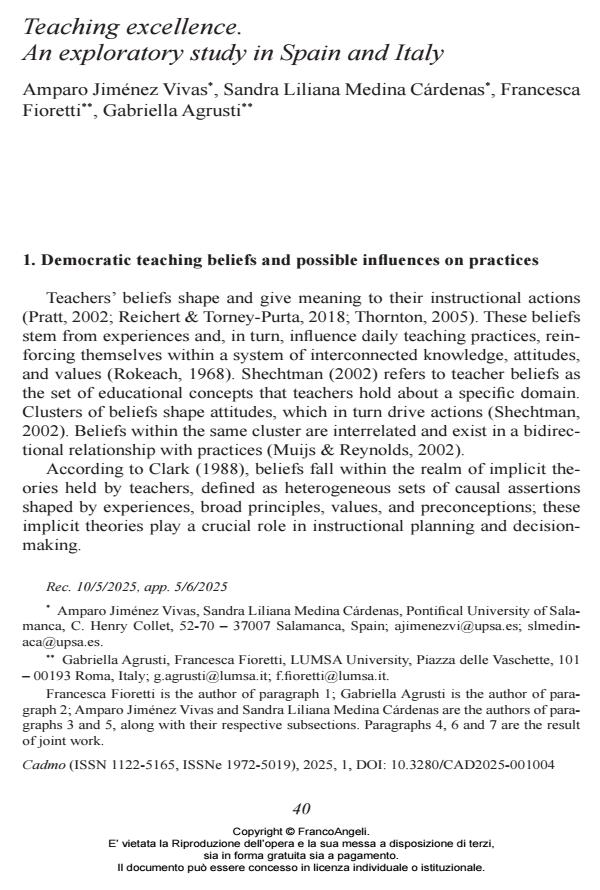Teaching excellence. An exploratory study in Spain and Italy
Titolo Rivista CADMO
Autori/Curatori Amparo Jiménez Vivas, Sandra Liliana Medina Cárdenas, Francesca Fioretti, Gabriella Agrusti
Anno di pubblicazione 2025 Fascicolo 2025/1
Lingua Inglese Numero pagine 17 P. 40-56 Dimensione file 222 KB
DOI 10.3280/CAD2025-001004
Il DOI è il codice a barre della proprietà intellettuale: per saperne di più
clicca qui
Qui sotto puoi vedere in anteprima la prima pagina di questo articolo.
Se questo articolo ti interessa, lo puoi acquistare (e scaricare in formato pdf) seguendo le facili indicazioni per acquistare il download credit. Acquista Download Credits per scaricare questo Articolo in formato PDF

FrancoAngeli è membro della Publishers International Linking Association, Inc (PILA)associazione indipendente e non profit per facilitare (attraverso i servizi tecnologici implementati da CrossRef.org) l’accesso degli studiosi ai contenuti digitali nelle pubblicazioni professionali e scientifiche
The study investigates the perceptions of teachers in Spain and Italy concerning their practices associated with teaching excellence. Grounded in recent theoretical frameworks on teaching professional competence, the research adopts an exploratory crossnational design to analyze excellence in everyday teaching. A total of 235 teachers from both countries participated in the study by completing a structured questionnaire composed of a validated scale measuring teaching excellence. Statistical analyses, including descriptive statistics, ttests, and exploratory factor analysis, were used to compare the results across national contexts. The findings reveal a strong shared commitment among teachers to participatory and reflective teaching practices, with notable differences in dimensions such as pedagogical innovation and subjectmatter expertise. The study concludes by emphasizing the importance of designing both initial and in-service teacher education programs that support reflective practices and strengthen professional development pathways.
Parole chiave:teachers, teaching excellence, democratic teaching beliefs, professional development, teaching practices.
Amparo Jiménez Vivas, Sandra Liliana Medina Cárdenas, Francesca Fioretti, Gabriella Agrusti, Teaching excellence. An exploratory study in Spain and Italy in "CADMO" 1/2025, pp 40-56, DOI: 10.3280/CAD2025-001004